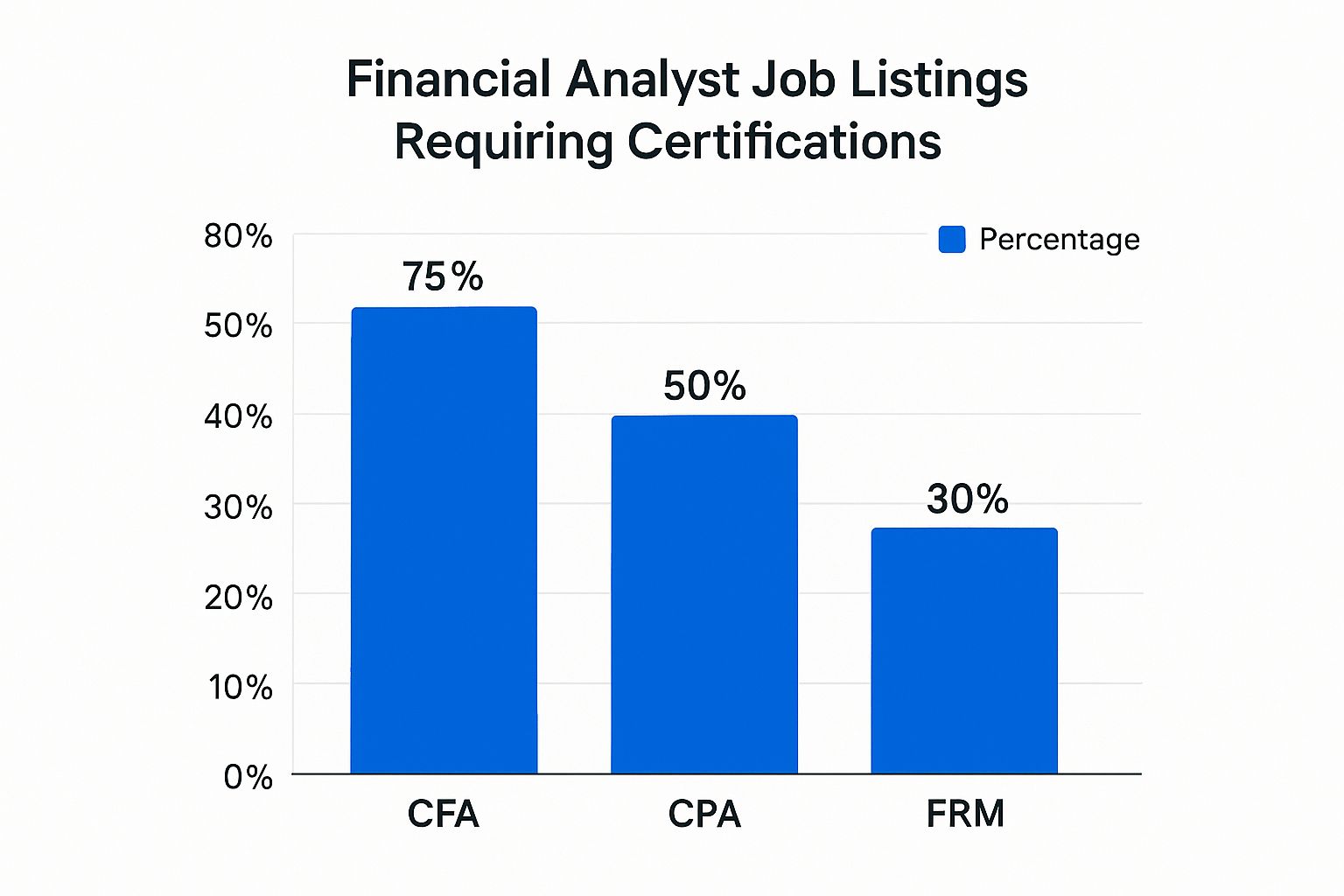Landing a financial analyst role in the UK isn't just about being good with numbers. It's about having the right combination of academic knowledge, hands-on technical skills, and real-world experience. Employers are looking for people who can do more than just read a spreadsheet; they need professionals who can uncover the story behind the data and steer major business decisions.
What UK Employers Really Want from Financial Analysts

Think of a great financial analyst less as a number-cruncher and more as a business detective. Their job is to dive deep into financial data—everything from balance sheets and income statements to market trends and competitor performance. They are searching for clues that reveal a company's financial health, its hidden risks, and its greatest opportunities.
In the UK's competitive financial landscape, this detective work is absolutely vital. Businesses depend on analysts to turn complex data into clear, actionable advice. An analyst's insight could be the deciding factor in whether a company launches a new product line, acquires a rival business, or pulls back on an underperforming investment.
The Three Pillars of a Financial Analyst
From my experience, success in this field really comes down to three core pillars. UK employers will closely examine each of these areas when you're applying for a role, and a weakness in one can quickly overshadow strengths in the others.
- Academic Foundation: This is your entry ticket. A solid degree in a subject like Finance, Economics, or Accounting is the baseline expectation.
- Technical Proficiency: You must be fluent in the tools of the trade. Mastery of Microsoft Excel for financial modelling is non-negotiable, and skills in SQL or Python are increasingly sought after.
- Essential Soft Skills: It's one thing to find the answer, but it's another to explain it. You need the ability to communicate your complex findings clearly and persuasively, often to people who don't live and breathe finance.
These pillars are completely interdependent. You could build the most sophisticated financial model in the world, but if you can't articulate what it means to the board of directors, its value is lost.
A financial analyst is essentially a translator and guide. They equip business leaders with the financial clarity and confidence needed to make sound strategic moves. Their true worth lies in transforming raw data into business intelligence.
To give you a clearer snapshot of what's expected, the table below summarises the core requirements for anyone aspiring to become a financial analyst in the UK.
Core Financial Analyst Requirements at a Glance
Think of this table as your foundational checklist. As we go deeper in the following sections, we'll unpack each of these requirements in much more detail to give you a complete roadmap for your career.
Building Your Academic and Professional Credentials
Think of your qualifications as your ticket to the interview. They’re the foundation you build your entire financial analyst career on, and without a strong one, things can get shaky. This is where you prove you have the analytical muscle and dedication that top employers are looking for.
The journey almost always starts with a university degree. A bachelor's in a number-heavy subject is pretty much non-negotiable. Fields like Finance, Economics, Accounting, or even Mathematics are big favourites because they give you the rigorous training you need to hit the ground running.
This is about more than just getting a piece of paper. The tough, quantitative nature of these degrees shows you can handle complex calculations, grasp economic theories, and think logically when the pressure is on. And let's be honest, the reputation of your university can play a role, especially when you're aiming for those coveted spots at top-tier investment banks.
The Gold Standard Professional Certification
A degree gets your foot in the door, but professional certifications are what make you stand out. They show you’re serious about this career. In the investment world, one qualification is king.
The Chartered Financial Analyst (CFA) charter is universally seen as the gold standard. It's not just another exam; it's a gruelling programme with three levels that cover a massive range of topics—from investment tools and valuing assets to managing entire portfolios.
Earning the CFA charter sends a powerful message. It tells employers you have a deep, globally respected level of expertise and that you’re committed to a strict ethical code. It’s a testament to dedication that few other qualifications can rival.
For many senior roles in equity research, portfolio management, and investment strategy, having the CFA charter isn't just a "nice-to-have"—it's often a requirement to move up the ladder.
Alternative Qualifications for Different Career Paths
The CFA isn't the only game in town, though. Depending on where you want to take your career, other qualifications might be just as valuable, if not more so. If you're leaning towards corporate finance or management accounting, a different set of credentials will serve you better.
ACCA (Association of Chartered Certified Accountants): This gives you an incredibly strong and thorough grounding in accounting, financial reporting, and auditing. It's highly respected for roles where you need to get deep into the weeds of a company's financial health.
CIMA (Chartered Institute of Management Accountants): CIMA is more about the intersection of accounting and business strategy. It trains you to advise on big business decisions and drive strategy from a financial angle, making it perfect for an in-house corporate finance career.
Choosing the right certification really boils down to your own ambitions. While the CFA is the heavyweight champion in the investment arena, ACCA and CIMA are powerhouses for anyone looking to build a career inside a company's finance team.
Once you’ve put in the hard work to earn these credentials, you need to make sure they get noticed. It's crucial to optimise your resume for Applicant Tracking Systems to get past the initial digital gatekeepers.
Finally, remember that strong qualifications aren't just for job hunting. They provide a shared language and framework that proves invaluable once you land the role. This solid base makes your transition into a new company much smoother, which is a huge benefit since a firm’s success often hinges on effective employee onboarding best practices.
The Technical Toolkit Every Analyst Must Master

While your qualifications might get your foot in the door, it’s your technical skills that truly define your performance on the job. These are the practical, hands-on abilities you’ll lean on every single day to turn mountains of raw data into sharp, actionable business intelligence. Getting these right is non-negotiable.
Think of your technical toolkit as having two essential layers. The first is the classic, foundational skillset that has been the backbone of financial analysis for decades. The second is a more modern data layer, one that’s becoming absolutely vital for any analyst who wants to stand out and stay relevant.
The Foundational Trio of Financial Analysis
At the very core of almost any financial analyst role, you'll find what many of us in the field call the "holy trinity" of technical skills. These three competencies are so deeply connected that being great at one is almost meaningless without the other two. They are the bedrock upon which all your analysis will be built.
Advanced Excel: This is your primary workbench. And I don't mean just basic sums and tables. We're talking about an expert-level command of functions like
VLOOKUP,INDEX-MATCH, andSUMIFS, alongside mastery of pivot tables and scenario analysis tools like Goal Seek. A deep understanding of Mastering Excel financial formulas—including PMT, NPV, and IRR—is simply indispensable.Financial Modelling: This is the art of building a dynamic, living representation of a company's financial future. A proper financial model isn't a static spreadsheet; it's an intricate engine that links the income statement, balance sheet, and cash flow statement. You’ll use it to forecast earnings, analyse the real impact of strategic decisions, and pressure-test your assumptions.
Valuation Techniques: This is where you answer the big question: "What is this company or asset actually worth?" The most common tool you'll use is a Discounted Cash Flow (DCF) model, which projects a company's future cash flows and then "discounts" them back to what they're worth today. You'll also use comparable company analysis (comps) and precedent transactions to triangulate a final, defensible valuation.
These three skills are designed to work in perfect harmony. You use your advanced Excel prowess to build a robust financial model, and that model becomes the platform for conducting your valuation.
Imagine you're tasked with deciding if your company should acquire a smaller competitor. You'd jump into Excel to build a detailed DCF model, projecting the target's future earnings and cash flows. The output of this model gives you a justifiable valuation, forming the core of your recommendation to leadership. That's the foundational trio in action.
The Modern Data Analytics Layer
While that classic trio is as important as ever, the sheer volume of data available today means analysts need to expand their arsenal. The most effective analysts now blend their finance skills with data manipulation and visualisation tools. This allows them to dig deeper and, just as importantly, tell more compelling stories with their findings.
These modern skills help you look beyond the traditional financial statements. You can start weaving in operational data, market trends, and even customer behaviour to paint a much more complete picture of business performance.
Key Data Tools for the Modern Analyst
SQL (Structured Query Language): Think of SQL as the key to the data kingdom. It’s the language you use to talk to and pull information from massive databases. Instead of waiting for the IT team to run a report, an analyst who knows SQL can directly query the company’s data warehouse to get precisely the information they need, right when they need it.
Python: This versatile programming language is fast becoming a powerhouse in finance. With libraries like Pandas for data manipulation and Matplotlib for creating charts, Python lets you automate repetitive tasks, analyse datasets so large they would crash Excel, and run sophisticated statistical models.
Tableau or Power BI: These are data visualisation platforms that let you transform dense spreadsheets into interactive dashboards. This is a critical communication skill. A well-designed visual can convey a complex trend far more powerfully than a boring table of numbers ever could.
Mastering these tools doesn't mean you abandon Excel. Far from it. The goal is to use them together. You might use SQL to pull raw sales data, clean and analyse it in Python, and then export the key takeaways back into your Excel financial model to see the impact on your forecast. This integrated approach is what separates a good analyst from a great one in today's data-rich world.
Soft Skills That Define a Top-Tier Analyst

While your technical expertise might get you in the door, it’s the soft skills that will really make your career. These are the human qualities that elevate a good financial analyst to an indispensable one, turning you from a number-cruncher into a genuine business influencer.
Think about it. You’ve just poured weeks into a complex valuation model for a potential acquisition. The model is perfect. But now you have to walk the board of directors through it, and most of them don't speak the language of finance. This is precisely where your soft skills shine.
The Art of Financial Storytelling
Exceptional analysts don’t just report data; they weave a story around it. Your ability to build a compelling narrative is what makes your insights stick and persuades decision-makers. It’s the difference between pointing to a spreadsheet and saying, "This acquisition could boost our market share by 15% in two years, but here’s why we need to be cautious about their distribution network."
This all comes down to connecting with your audience. You need to understand their priorities and tailor your message to resonate with what they care about. It’s not just about slick presentations; it’s about empathy and strategic communication. That’s why many forward-thinking companies are investing in communication skills training for employees to build this crucial capability.
Critical Thinking and Problem-Solving
Great analysts are naturally curious. They don't just report the "what"—they constantly dig for the "why." That’s the core of critical thinking in finance. It’s about looking at a set of financial statements and questioning the business reality that created those numbers.
An analyst's real value isn't in their ability to run a model, but in their ability to question its assumptions. They must challenge the status quo and probe for weaknesses in an argument, including their own.
This curious nature is directly tied to problem-solving. When you’re hit with confusing data or a sudden market downturn, you need to think on your feet. It’s about forming a hypothesis, testing it rigorously, and finding a clear path forward.
Resilience and Collaboration in High-Stakes Environments
Let’s be honest: finance can be a pressure cooker. You’ll be up against tight deadlines, intense scrutiny, and high-stakes decisions. Resilience—the ability to stay calm and focused when the heat is on—isn’t just a nice-to-have; it’s essential.
You also won't be working in a vacuum. Big projects, like an IPO or a merger, are massive team efforts. Your success hinges on how well you work with people from legal, operations, marketing, and beyond. A collaborative spirit ensures your financial insights are woven into the company's wider strategy, not just left in a spreadsheet. This blend of mental fortitude and teamwork is what truly sets a top-tier analyst apart.
Your Career Path and Salary Growth as a Financial Analyst
In the world of finance, experience is everything. The journey from a fresh-faced graduate to a seasoned senior analyst is a well-trodden path, marked by growing responsibilities, more complex challenges, and, of course, a healthier pay packet. This isn't just about time served; it's about deliberately building your expertise and proving your value.
For most aspiring analysts in the UK, the starting line is usually an internship or a structured graduate scheme. Think of these as your apprenticeship. They're designed to throw you into the deep end of real-world finance, giving you crucial hands-on experience and helping you build a professional network right from the get-go.
The Analyst Career Ladder
As you rack up experience, your role will change dramatically. The career ladder for a financial analyst is quite clear, shifting from hands-on tasks to high-level strategy.
Junior Financial Analyst (0-2 Years): At this point, you're all about learning the ropes. Your days will be filled with gathering data, updating financial models, and preparing smaller sections of larger reports. It's the foundational work that instils the sharp attention to detail you'll need for the rest of your career.
Financial Analyst (2-5 Years): With a couple of years under your belt, you'll start taking on more ownership. You’ll find yourself building more sophisticated models from scratch, performing deeper analysis, and starting to present your findings to your team. Your insights begin to genuinely influence decisions.
Senior Financial Analyst (5+ Years): As a senior, you're no longer just a "doer"—you're a leader. You'll be expected to manage complex projects from start to finish, mentor the junior members of the team, and communicate your insights directly to senior management and clients. Your focus shifts from data crunching to strategic guidance.
How Your Earnings Potential Evolves
It’s simple: as your responsibilities increase, so does your salary. Experience and compensation are tightly linked, especially in a major financial hub like London where top talent is always in demand.
A financial analyst's salary progression is a direct reflection of their growing value to an organisation. Each step up the ladder represents a deeper level of trust, greater strategic impact, and a corresponding increase in financial reward.
Here’s a snapshot of what you can typically expect in London as you progress through your career.
Financial Analyst Salary Progression in London
This table shows a clear upward trend. While a junior analyst starts strong, moving into a mid-level role with 2-5 years of experience pushes your earnings into the £55,000 to £80,000 bracket. Seasoned pros with over five years under their belt often see their pay climb towards the top of that range and beyond, especially when bonuses are factored in.
The Impact of Certifications on Your Career
Professional certifications can be a serious catalyst for your career. As you map out your future, earning a credential like the Chartered Financial Analyst (CFA) designation can open doors to more senior roles and significantly boost your earning potential.
Just look at how often certain qualifications pop up in job descriptions for financial analysts.

The data speaks for itself—the CFA is by far the most requested certification, cementing its reputation as the gold standard in the investment world.
When planning your next career move or heading into a salary negotiation, having a solid grasp of the market is crucial. Doing some proper market salary research will help you benchmark your expectations and negotiate with confidence. It's also worth considering a partnership with specialist finance recruitment agencies; they can offer expert advice and connect you with opportunities that perfectly match your ambitions.
Answering Your Key Questions
Thinking about a career as a financial analyst brings up a lot of practical questions. Let's tackle some of the most common queries we see, giving you clear answers so you can map out your career path with more confidence.
Do I Need a Masters Degree to Be a Financial Analyst?
Not necessarily, but it can be a serious career booster. For most entry-level jobs, a solid undergraduate degree in a relevant field from a good university is more than enough to get your foot in the door.
Where a Master's degree really comes into its own is when you're trying to stand out from the crowd. It can make you a far more competitive candidate, especially if you have your sights set on elite firms in investment banking or private equity. It's also a fantastic way to pivot into finance if your original degree was in something like engineering or computer science.
Think of it less as a mandatory ticket to entry and more as a strategic investment in your future.
How Important Is the CFA Charter?
The Chartered Financial Analyst (CFA) charter is hugely respected and often called the 'gold standard' in the investment world. How crucial it is for you really hinges on where you want to take your finance career.
If you're heading into corporate finance or management accounting, it’s a nice-to-have but not always essential. On the other hand, it's practically a must-have for moving up the ladder in fields like:
- Asset management
- Equity research
- Portfolio management
- Investment strategy
Getting through the tough CFA exams shows you have a deep understanding of finance, a serious work ethic, and a commitment to high ethical standards. That’s exactly why many top employers will sponsor their analysts to complete the programme; they see it as a vital part of professional development.
A CFA charter doesn't just add another line to your CV; it demonstrates a level of dedication and expertise that instantly commands respect from employers and peers alike. It is one of the clearest signals you can send about your commitment to the profession.
Can I Become a Financial Analyst with a Non-Finance Degree?
Absolutely. In fact, it’s quite common. Many firms actively look for graduates with degrees in quantitative fields like engineering, physics, maths, and computer science. The analytical and problem-solving skills you learn in these subjects are incredibly valuable and transfer well.
The trick is to prove you're genuinely passionate about finance and have put in the work to bridge the knowledge gap. You can do this by:
- Passing the CFA Level I exam: This is one of the best ways to show you've mastered the fundamentals.
- Completing finance-focused online courses: Get up to speed on financial modelling, accounting, and valuation.
- Getting a relevant internship: Nothing proves your commitment like hands-on experience.
- Networking: Talk to people in the industry. It helps you learn the lingo and understand what's really happening in the markets.
You need to show you have both the raw analytical talent and the specific financial know-how to hit the ground running.
What Is a Typical Entry-Level Financial Analyst Salary?
Here in the UK, a graduate financial analyst can typically expect a starting salary in the range of £35,000 to £45,000. That figure is usually higher in London, reflecting both the higher cost of living and the sheer concentration of major financial firms.
Remember, that's just the base salary. Most analyst roles also come with a performance-based bonus, which can add a significant chunk to your annual earnings, even in your first year. With one or two years of good experience under your belt, you can expect that base salary to climb steadily as your skills and contributions grow.

